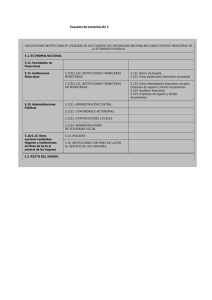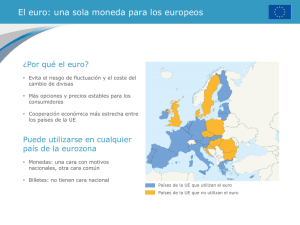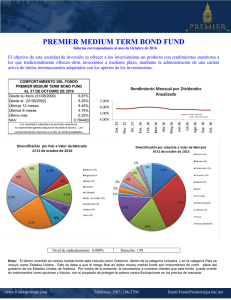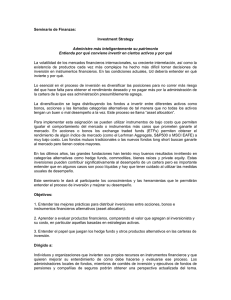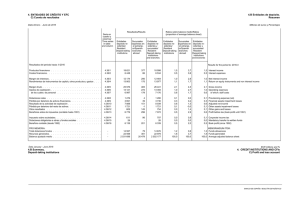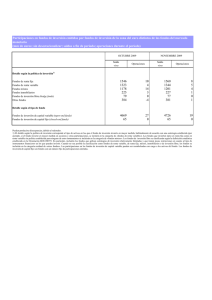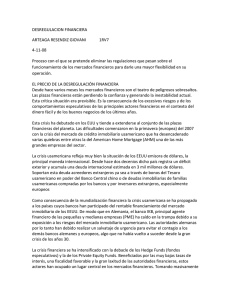Boletín Estadístico. Esquema de sectorización
Anuncio
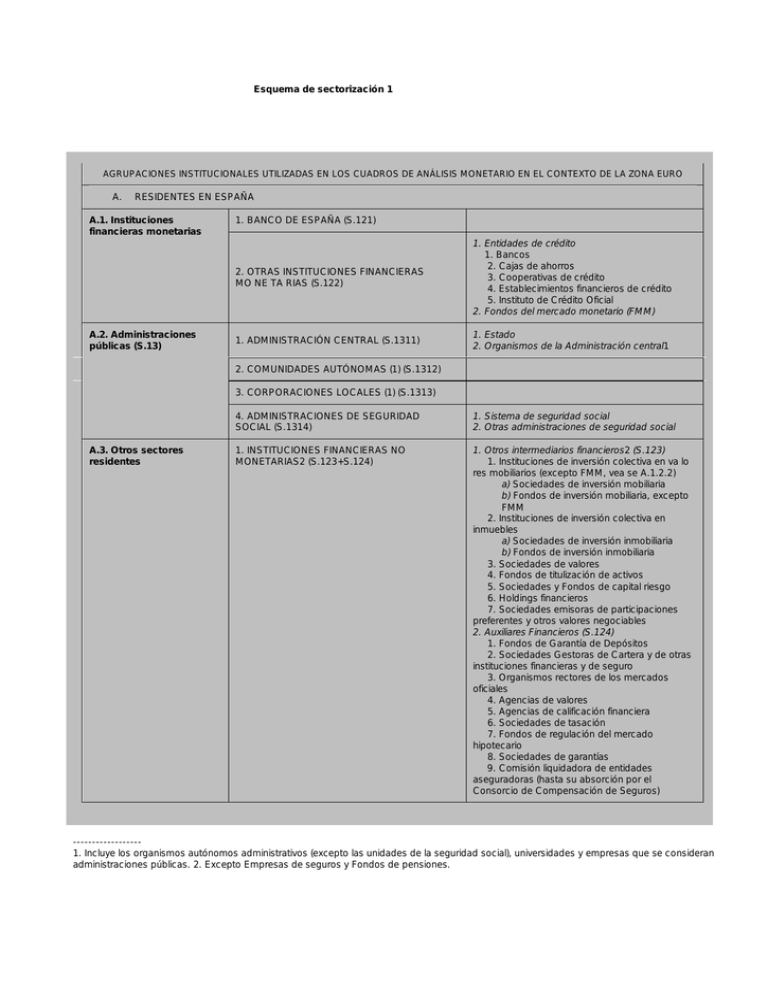
Esquema de sectorización 1 AGRUPACIONES INSTITUCIONALES UTILIZADAS EN LOS CUADROS DE ANÁLISIS MONETARIO EN EL CONTEXTO DE LA ZONA EURO A. RESIDENTES EN ESPAÑA A.1. Instituciones financieras monetarias A.2. Administraciones públicas (S.13) 1. BANCO DE ESPAÑA (S.121) 2. OTRAS INSTITUCIONES FINANCIERAS MO NE TA RIAS (S.122) 1. Entidades de crédito 1. Bancos 2. Cajas de ahorros 3. Cooperativas de crédito 4. Establecimientos financieros de crédito 5. Instituto de Crédito Oficial 2. Fondos del mercado monetario (FMM) 1. ADMINISTRACIÓN CENTRAL (S.1311) 1. Estado 2. Organismos de la Administración central1 2. COMUNIDADES AUTÓNOMAS (1) (S.1312) 3. CORPORACIONES LOCALES (1) (S.1313) A.3. Otros sectores residentes 4. ADMINISTRACIONES DE SEGURIDAD SOCIAL (S.1314) 1. Sistema de seguridad social 2. Otras administraciones de seguridad social 1. INSTITUCIONES FINANCIERAS NO MONETARIAS2 (S.123+S.124) 1. Otros intermediarios financieros2 (S.123) 1. Instituciones de inversión colectiva en va lo res mobiliarios (excepto FMM, vea se A.1.2.2) a) Sociedades de inversión mobiliaria b) Fondos de inversión mobiliaria, excepto FMM 2. Instituciones de inversión colectiva en inmuebles a) Sociedades de inversión inmobiliaria b) Fondos de inversión inmobiliaria 3. Sociedades de valores 4. Fondos de titulización de activos 5. Sociedades y Fondos de capital riesgo 6. Holdings financieros 7. Sociedades emisoras de participaciones preferentes y otros valores negociables 2. Auxiliares Financieros (S.124) 1. Fondos de Garantía de Depósitos 2. Sociedades Gestoras de Cartera y de otras instituciones financieras y de seguro 3. Organismos rectores de los mercados oficiales 4. Agencias de valores 5. Agencias de calificación financiera 6. Sociedades de tasación 7. Fondos de regulación del mercado hipotecario 8. Sociedades de garantías 9. Comisión liquidadora de entidades aseguradoras (hasta su absorción por el Consorcio de Compensación de Seguros) -----------------1. Incluye los organismos autónomos administrativos (excepto las unidades de la seguridad social), universidades y empresas que se consideran administraciones públicas. 2. Excepto Empresas de seguros y Fondos de pensiones. Sectorisation scheme 1 INSTITUTIONAL GROUPINGS USED IN EURO AREA MONETARY ANALYSIS TABLES A. DOMESTIC A.1. Monetary Financial Institutions A.2. General government (S.13) 1. BANCO DE ESPAÑA (S.121) 2. OTHER MONETARY FINANCIAL INSTITUTIONS (S.122) 1. Credit institutions 1. Private banks 2. Savings banks 3. Credit co-operative banks 4. Specialised lending institutions 5. Instituto de Crédito Ofi cial (ICO) 2. Money market funds 1. CENTRAL GOVERNMENT (S.1311) 1. State (central government except government agencies) 2. Central government agencies1 2. REGIONAL (AUTONOMOUS) GOVERNMENTS (1) (S.1312) 3. LOCAL GOVERNMENTS (1) (S.1313) A.3. Other resident sectors 4. SOCIAL SECURITY FUNDS (S.1314) 1. Social Security System 2. Other social security funds 1. NON-MONETARY FINANCIAL INSTITUTIONS2 (S.123+S.124) 1. Other financial intermediaries2 (S.123) 1. Portfolio investment institutions (except Money market funds, see A.1.2.2) a) Open-end investment companies b) Mutual funds, except Money market funds 2. Real estate investment institutions a) Real estate investment companies b) Real estate mutual funds 3. Securities-dealer companies 4. Asset securitisation vehicles 5. Venture capital funds and companies 6. Financial holding companies 7. Issuers of preference shares and other negotiable securities 2. Financial auxiliaries (S.124) 1. Deposit guarantee funds of deposits institutions 2. Portfolio management companies and the management companies of other fi nancial and insurance institutions 3. Offi cial market governing bodies 4. Securities agencies 5. Rating agencies 6. Appraisal companies 7. Mortgage market regulations funds 8. Guarantee companies 9. Comisión liquidadora de entidades aseguradoras (until its inclusion in Consorcio de Compensación de Seguros) -----------------1. Including autonomous administrative agencies (except social security units), universities and corporations considered to be part of general government. 2. Except insurance corporations and pension funds. Esquema de sectorización 1 (continuación) AGRUPACIONES INSTITUCIONALES UTILIZADAS EN LOS CUADROS DE ANÁLISIS MONETARIO EN EL CONTEXTO DE LA ZONA EURO A.3. Otros sectores residentes (continuación) 10. Establecimientos de cambio de moneda 11. Sociedades de compensación y liquidación de valores 12. Holdings que realizan actividades de auxiliares financieros 2. EMPRESAS DE SEGUROS Y FONDOS DE PENSIONES (S.125) 1. Seguros privados 2. Entidades de previsión social 3. Consorcio de Compensación de Seguros 4. Fondos de pensiones 3. SOCIEDADES NO FINANCIERAS3 (S.11) 4. HOGARES E INSTITUCIONES SIN FINES DE LUCRO4 (S.14+S.15) B. RESIDENTES EN OTROS PAÍSES DE LA ZONA DEL EURO B.1. Instituciones financieras monetarias (S.12) 1. EUROSISTEMA5 (excepto Banco de España) 2. OTRAS INSTITUCIONES FINANCIERAS MONETARIAS B.2. Administraciones Públicas (S.13) 1. ADMINISTRACIÓN CENTRAL (S.1311) 2. OTRAS ADMINISTRACIONES PÚBLICAS B.3. Otros sectores residentes 1. Administración regional (S.1312) 2. Administración local (S.1313) 3. Administraciones de seguridad social (S.1314) 1. INSTITUCIONES FINANCIERAS NO MONETARIAS2 (S123+S124) 2. EMPRESAS DE SEGUROS Y FONDOS DE PENSIONES (S.125) 3. SOCIEDADES NO FINANCIERAS3 (S.11) 4. HOGARES E INSTITUCIONES SIN FINES DE LUCRO4 (S.14+S.15) C. RESTO DEL MUNDO C.1. Bancos C.2. Agencias no Bancarias 1. ADMINISTRACIONES PÚBLICAS 2. OTROS RESIDENTES Por memoria I. Instituciones financieras residentes en España (A.1+A.3.1+A.3.2) II. Instituciones financieras residentes en otros países de la zona del euro (B.1+B.3.1+B.3.2) ---------------------NOTA GENERAL: Los códigos que figuran detrás de las principales agrupaciones (S.12, S.13, ...) son los del Sistema Europeo de Cuentas 1995 (SEC95), aprobado por el Reglamento (CE) Nº 2223/96 del Consejo, de 25 de junio de 1996. 3. Públicas y privadas. 4. ISFL al servicio de los hogares. 5. El Eurosistema está formado por el Banco Central Europeo y los bancos centrales nacionales de la zona del euro. Sectorisation scheme 1 (continued) INSTITUTIONAL GROUPINGS USED IN EURO AREA MONETARY ANALYSIS TABLES A.3. Other resident sectors (continued) 10. Currency-exchange bureaux 11. Securities cleaning and settlement companies 12. Holdings companies that themselves carry out activities of fi nancial auxiliaries 2. INSURANCE CORPORATIONS AND PENSION FUNDS (S.125) 1. Life and risk insurance corporations 2. Non-profit insurance institutions 3. Consorcio de Compensación de Seguros 4. Pension funds 3. NON-FINANCIAL CORPORATIONS3 (S.11) 4. HOUSEHOLDS AND NON-PROFIT INSTITUTIONS4 (S.14+S.15) B. RESIDENTS IN OTHER EURO AREA COUNTRIES B.1. Monetary Financial Institutions (S.12) 1. EUROSYSTEM5 (except Banco de España) B.2. General government (S.13) 1. CENTRAL GOVERNMENT (S.1311) 2. OTHER MONETARY FINANCIAL INSTITUTIONS 2. OTHER GENERAL GOVERNMENT B.3. Other resident sectors 1. State government (S.1312) 2. Local government (S.1313) 3. Social security funds (S.1314) 1. NON-MONETARY FINANCIAL CORPORATIONS2 (S123+S124) 2. INSURANCE CORPORATIONS AND PENSION FUNDS (S.125) 3. NON-FINANCIAL CORPORATIONS3 (S.11) 4. HOUSEHOLDS AND NON-PROFIT INSTITUTIONS4 (S.14+S.15) C. REST OF THE WORLD C.1. Banks C.2. Non-banks 1. GENERAL GOVERNMENT 2. OTHER RESIDENTS Memorandum ítem I. Domestic fi nancial institutions (A.1+A.3.1+A.3.2) II. Financial institutions of other euro area countries (B.1+B.3.1+B.3.2) ---------------------GENERAL NOTE: Codes after institutional groupings (S.12, S.13...) refer to the European System of Accounts 1995 (ESA 95), approved by Council Regulation (EC) No 2223/96 of 25 June 1996. 3. Public and private. 4. NPIs serving households. 5. The eurosystem consists of the ECB and the national central Banks of the euro area.
